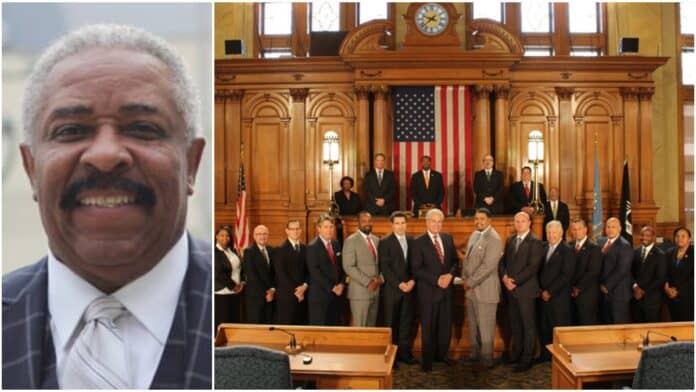City Attorney Tearman Spencer was accused of harassment by multiple city employees, and the city’s investigative report says the city can’t hold an elected official to its anti-harassment policies. But is there really nothing the city can – or should – do?
Wisconsin Right Now has determined that the Milwaukee Common Council has the authority to remove Tearman Spencer from his elected office for cause, and that’s according to state law. Furthermore, the mayor, Tom Barrett, can suspend Spencer while any such investigation proceeds. We spoke with Claire Silverman, the general counsel for the Wisconsin League of Municipalities, who confirmed that is the correct reading of state law.
But will they? We asked Milwaukee Common Council President Cavalier Johnson whether the Common Council will and should seek to remove Spencer from office and for his general reaction to the accusations. “Good afternoon. In my opinion, elected officials should be held to the same, if not a higher, standard for conduct in our official offices – especially as it relates to issues around harassment given the events of the last few years,” he told WRN. “We will be undergoing an internal review of options available to make sure that all City employees, including the elected ones myself included, are subject to an anti-harassment policy.”
Furthermore, we spoke to a well-known New Berlin employment lawyer, Alan Olson, who said the city has an “obligation” under both state and federal law to protect its employees from harassment. He called the city’s comment that Spencer doesn’t fall under its anti-harassment policy “ridiculous.” If the city doesn’t take action to protect the employees, it’s opening itself up to major potential liability, he said, especially as the city is now “on notice” that the concerns exist.
“An employer has a duty to maintain a workplace free of retaliation and discrimination and harassment,” Olson said. “It’s pretty absurd to suggest the city doesn’t have a responsibility to protect employees from the city attorney.”
He said the employees are basically held “hostage to that environment if they want their paychecks” so “anyone entering that space” triggers state and federal law regarding the “employer’s responsibility to protect them.”
The Allegations
The city has known about some of the allegations since April 2020, about the time Spencer was elected to the office. The harassment investigation occurred in October and was completed in December. WRN filed an open records request to get the report in February; the report was released in April 2021. The report says that at least six workers complained about Spencer’s comments and behavior. The city outlines a series of suggestions in the report that Spencer do things like hold focus groups and conduct more training on harassment.
When former Milwaukee Mayor John Norquist was accused of harassing Marilyn Figueroa, there was massive news coverage and Norquist faced extreme public pressure. He eventually paid Figueroa off to settle a claim she filed with the state and then announced he wasn’t seeking re-election. In contrast, there’s been crickets from Milwaukee aldermen, the mayor, and most of the media (except the Milwaukee Journal Sentinel, which also ran a story on the claims), when it comes to Spencer, a Gwen Moore ally who defeated long-time respected incumbent Grant Langley for the office. Spencer has a background in real estate law and winning settlements for clients; for months the Milwaukee police have raised concerns that they don’t think he’s serving their interests in cases, such as the controversy involving Bucks player Sterling Brown.
We wrote Mayor Tom Barrett and Johnson and asked them whether they think Spencer should be removed from office (and we asked Johnson whether the Common Council will take action to do so), and Barrett hasn’t responded.
“At least six (6) employees have individually complained about Mr. Spencer, and there are several others who have witnessed the behavior,” the report says. “Among such concerns are several incidents of potentially offensive/discriminatory verbal comments and behavior, as well as one incident of unwelcome physical contact with a female colleague.” The complaint said: “One female employee reported that she was physically touched on her body by Mr. Spencer.”
The report concluded, “An elected official, the City Attorney is not bound by the Anti-Harassment Policy. Comments based on gender, gender identity, physical appearance and body parts, and touching are not appropriate workplace behavior.”
The report did find, “The investigation did not conclude that adverse employment actions were taken because of gender. Most, if not all, of the employment decisions that were brought forward during the investigation were made at the recommendation of the Deputies for legitimate work-related reasons.”
You can read the full report and more about the specific allegations here in our previous story.
Who Can Remove Tearman Spencer?
In 2018, Silverman authored an article for the Wisconsin League of Municipalities that outlined the removal process for elected city officeholders. In an email interview with WRN on April 8, 2021, she confirmed that those provisions were still correct.
In the article, Silverman wrote, “Removal of city officers is governed by Wis. Stat. sec. 17.12, which was recently modified by 2017 Wis. Act 1502. The bases for removal vary depending on whether the office is elective or appointive. Elective officers can be removed by the common council for cause. ‘Cause’ is defined as “inefficiency, neglect of duty, official misconduct or malfeasance in office.”
She further noted, “Removals by the common council require an affirmative vote of three-fourths of all the members thereof. Removals by any other body consisting of three or more members, require an affirmative vote of two-thirds of all the members thereof. Any officer lawfully removed from office is ineligible to appointment or election to fill the vacancy caused by the person’s removal.8The mayor may summarily suspend from office any city officer whose removal is being sought and against whom charges have been filed, and may appoint an officer to discharge the duties of that office until such charges have been disposed of.”
According to Silverman, “Removals from office for cause must follow the procedure set forth in Wis. Stat. sec. 17.16 and are more complicated. Removal for cause under sec. 17.16 requires that a resident taxpayer of the governmental unit bring written verified charges against the officer. These charges must be followed by a speedy public hearing at which the officer must be given a full opportunity to present a defense against the charges, personally and by counsel. Section 17.16(3) contains important details relating to the time frame for notifying the officer of the charges and hearing, and delivery of the notice.”
In addition, citizens have the power to petition for the recall of an elected city officeholder. The recall petition must “be signed by electors equal to at least 25 percent of the vote cast for the office of governor at the last election within the same district or territory as that of the officeholder targeted for recall” she wrote.
An Employment Lawyer Response
Alan Olson, the employment lawyer we interviewed, was adamant: The city must give its workers a workplace free of harassment. “They have a duty to protect,” he stressed. “They have a duty to stop the harassment. If it is physical in nature, then the level of duty of care rises.”
Olson said that case law holds that even a city must protect its employees from even a vendor or outside worker – such as an UPS worker who comes into City Hall – from harassment. In the case of Spencer, he has more authority over the workers as he’s the boss, according to Olson.
As to what the city can do, he said the city could also do such things as “determine to what extent they will allow the city attorney to have access to the premises to interact with employees.”
Tearman Spencer’s Response
Spencer has been generally defiant in response to the claims. The report says:
“The Respondent’s response to the allegations was generally that some employees were not happy that he had won the election and were resistant to change. Because of this resistance to change, the employees were looking for reasons to complain about him. In terms of the types of comments he made, he characterized these complaints as making too much out of minor issues. Some comments he admitted making, some were made to lighten the meeting/conversation with humor, and some comments or actions he did not recall. In addition, he called out the need to get to know 66 employees while the department is transitioning to new leadership and while much of the City Attorney department’s work is being accomplished while employees are working remotely vs. onsite. The Respondent did not acknowledge that his words or actions may have played a part in the employees’ perception that he made harassing comments and exhibited behavior targeting female employees in the workplace.”
In emails included in the document release,
Spencer tried to keep the documents from being released. “As you have been made aware, even though I am not legally bound by the City of Milwaukee’s Anti-Harassment Policy, I fully cooperated in Attorney Holiday’s investigation and voluntarily submitted to interviews relating to the meritless allegations lodged against me,” he wrote.
“Further, the investigator expressly concluded that no employment actions were taken on account of gender and most, if not all, employment decisions were made for legitimate work-related reasons. At no point did the investigator conclude that I made inappropriate remarks of a sexual nature or that I had touched anyone in an inappropriate manner. In short, I was not found to have violated any employment law or policy of the City of Milwaukee. Nevertheless, for the reasons set forth below, I write, in my personal capacity, to request that you refrain from releasing any information or material gathered or prepared in connection with the confidential personnel investigation led by Attorney Holiday.”
He told the Journal Sentinel when asked if he promises not to retaliate: “Spencer said he does not make promises. But he added, ‘I’m not one to retaliate.'”
He admitted calling a staffer “sweetie” and discussing a female employee’s calves in a meeting, the JS wrote.
Table of Contents




















![WATCH: Elon Musk Town Hall Rally in Green Bay [FULL Video]](https://www.wisconsinrightnow.com/wp-content/uploads/2022/04/Elon_Musk_3018710552-218x150.jpg)

